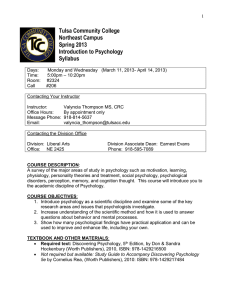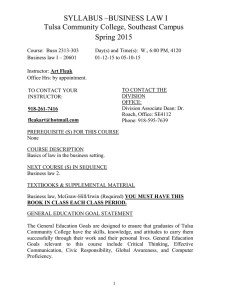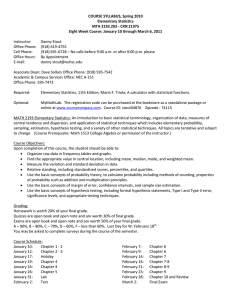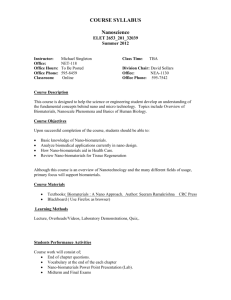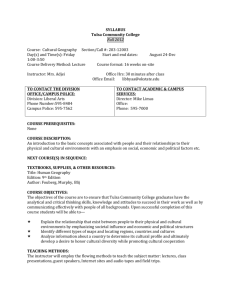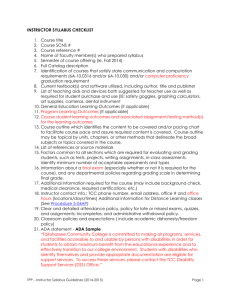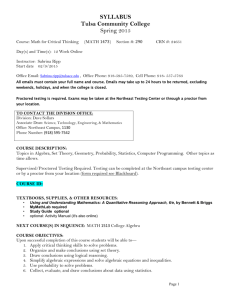new window - Blackboard Learn
advertisement
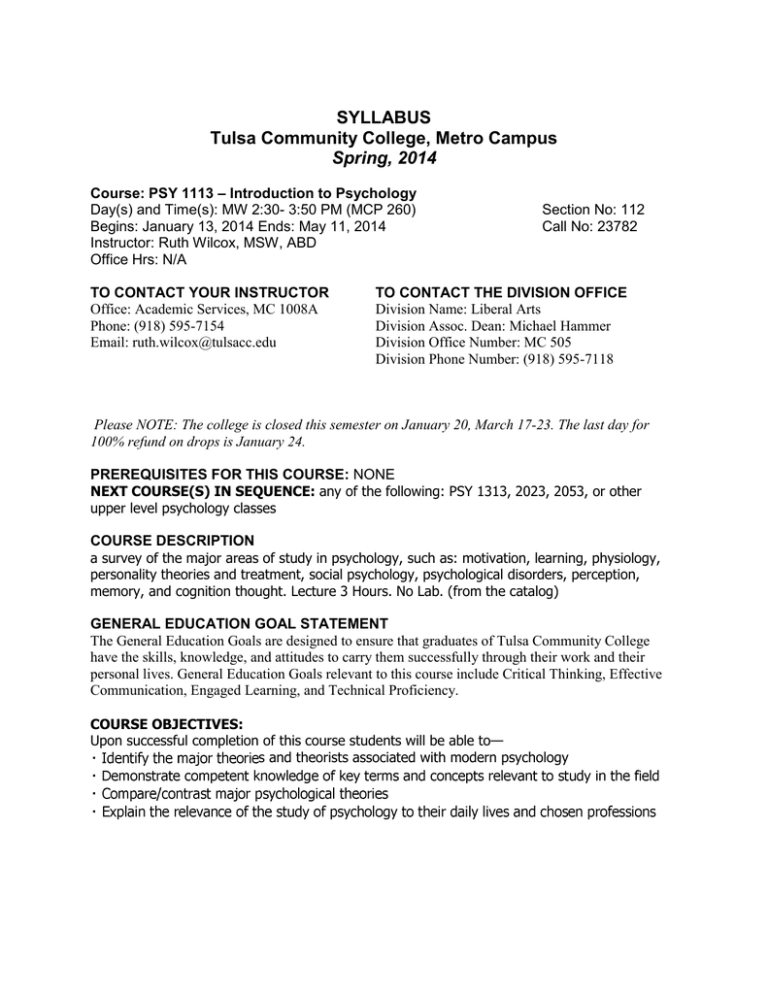
SYLLABUS
Tulsa Community College, Metro Campus
Spring, 2014
Course: PSY 1113 – Introduction to Psychology
Day(s) and Time(s): MW 2:30- 3:50 PM (MCP 260)
Begins: January 13, 2014 Ends: May 11, 2014
Instructor: Ruth Wilcox, MSW, ABD
Office Hrs: N/A
TO CONTACT YOUR INSTRUCTOR
Office: Academic Services, MC 1008A
Phone: (918) 595-7154
Email: ruth.wilcox@tulsacc.edu
Section No: 112
Call No: 23782
TO CONTACT THE DIVISION OFFICE
Division Name: Liberal Arts
Division Assoc. Dean: Michael Hammer
Division Office Number: MC 505
Division Phone Number: (918) 595-7118
Please NOTE: The college is closed this semester on January 20, March 17-23. The last day for
100% refund on drops is January 24.
PREREQUISITES FOR THIS COURSE: NONE
NEXT COURSE(S) IN SEQUENCE: any of the following: PSY 1313, 2023, 2053, or other
upper level psychology classes
COURSE DESCRIPTION
a survey of the major areas of study in psychology, such as: motivation, learning, physiology,
personality theories and treatment, social psychology, psychological disorders, perception,
memory, and cognition thought. Lecture 3 Hours. No Lab. (from the catalog)
GENERAL EDUCATION GOAL STATEMENT
The General Education Goals are designed to ensure that graduates of Tulsa Community College
have the skills, knowledge, and attitudes to carry them successfully through their work and their
personal lives. General Education Goals relevant to this course include Critical Thinking, Effective
Communication, Engaged Learning, and Technical Proficiency.
COURSE OBJECTIVES:
Upon successful completion of this course students will be able to—
s and theorists associated with modern psychology
TEXTBOOKS, SUPPLIES, & OTHER RESOURCES:
Title: Psychology: From inquiry to understanding, 2nd Ed.
Author: Lilienfeld, S. O., Lynn, S. J., Namy, L. L., & Woolf, N. J.
Publisher: Pearson
APA citation: Lilienfeld, S. O., Lynn, S. J., Namy, L. L., & Woolf, N. J. (2011). Psychology: From
inquiry to understanding, 2nd Ed. New York, NY: Pearson.
Textbooks and supplies may be purchased at: the TCC bookstore or online
Email address: All TCC students receive a designated “email address (example:
jane.doe@tulsacc.edu). All communications to you about TCC and course assignments will be sent to
your TCC email address; and you must use TCC email to send email to, and receive email from, the
instructor regarding this course. You access your TCC email at
http://www.outlook.com/tulsacc.edu through 2/25/2014.
COMPUTER ACCESS
It is highly recommended that you have regular computer access, preferably a home computer with
broadband Internet access, as I use Blackboard regularly to provide notices regarding course
activities and to provide supplemental materials for the course. This course can be completed using
public computers at TCC or other public access areas; however, be aware that using public
computers may create a hardship. All course requirements remain the same whether your computer
access is public or private (home).
TECHNICAL SKILL REQUIREMENTS
You should be comfortable with the following:
using a word processor (changing font, spell check)
using email for communication
sending an email attachment
navigating the Internet
using an Internet search engine
TEACHING METHODS
Strategies may include: Reading resources (textbooks); lectures; written assignment (with
instructions); project and process-oriented individual and collaborative projects; use of the
discussion board; use of the Internet; and e-mails among students and between individual students
and the professor. Students are responsible for completing all assigned work.
ATTENDANCE – TIME COMMITMENT – STUDENT EXPECTATIONS
Attendance/regular participation is essential for maintaining the best learning environment. Learning
occurs in relationship not only between student and course materials, but, just as importantly, peer to
peer, professor to student, and student to professor. Participation in this course is the responsibility of
the student. Students receiving benefits from government agencies must adhere to policies stipulated
by the specific agency.
Participation will be measured by presence in class and participation in class discussions and
activities.
ADMINISTRATIVE WITHDRAWL FOR NON-PARTICIPATION
Students who fail to participate in the course during the first week will be Administratively
Withdrawn from the course.
EVALUATION TECHNIQUES
Regular exams (at least 4 @ 100 points- lowest score may be dropped)
Comprehensive Final exam (100 points – may be substituted for lowest test grade)
Participation (10 points/class)
Student exams/assignments that are submitted by the stated due date will be graded and returned
within 1 week of the due date. Assignments submitted after the stated due date in accordance with the
late work policy will be returned as soon as possible, but may not be returned until the end of the
semester.
Your corrected (graded) assignments (with comments about the quality of your work) can be
accessed through the Student Gradebook. Click on the underlined score for an assignment to open
the window containing my comments and returned Word document. Please make sure that you read
these comments!
TESTING POLICY (if applicable)
Your regular and final examinations will be administered in class. Should you need to makeup an
exam, you will need to go to the Testing Center to do so.
TENTATIVE SCHEDULE OF ACTIVITIES
Please refer to the Tentative Course agenda for the schedule of readings, assignments and exams.
MAKE-UP AND LATE ASSIGNMENT/EXAM POLICY
Make-up exams need to be completed within 10 days of the original testing date. The exception is the
fourth and final exams. These cannot be made up.
CLASSROOM ETIQUETTE
Open and mutually respectful communication of varied opinions, beliefs, and perspectives during
classroom or online discussion encourages the free exchange of ideas that is essential to higher
learning and to the ability to learn from each other. Use of any electronic device is at the discretion
of the instructor.
INSTUTIONAL STATEMENT
Each student is responsible for being aware of the information contained in the TCC Catalog, the
TCC Student Policies & Resources Handbook, and semester information listed in the class schedule.
All information may be viewed on the TCC website: www.tulsacc.edu.
TRANSFERABILITY:
Please visit with the TCC Counseling Center or the Counseling Center at the college or university to
which you plan to transfer to determine transferability status of this course.
COURSE WITHDRAWAL:
The deadline to withdraw from a course shall not exceed 3/4 the duration of any class. Check the
TCC Academic Calendar for the deadline that applies to the course(s). Begin the process with a
discussion with the faculty member assigned to the course. Contact the Advisement Office at any
TCC campus to initiate withdrawal from a course ('W' grade) or to change from Credit to Audit.
Withdrawal and/or change to an audit from a course after the drop/add period can alter the financial
aid award for the current and future semesters. Students may receive an outstanding bill from TCC if
the recalculation leaves a balance due to TCC. Students who stop participating in the course and fail
to withdraw may receive a course grade of “F,” which may have financial aid consequences for the
student.
ADA POLICY
DISABILITY RESOURCES: It is the policy and practice of Tulsa Community College to create
inclusive learning environments. Accommodations for qualifying students in compliance with the
Americans with Disabilities Act (ADA) and Section 504 of the Rehabilitation Act are available. To
request accommodations, contact the Education Access Center (EAC) at eac@tulsacc.edu or call (918)
595-7115 (Voice). Deaf and hard of hearing students may text (918) 809-1864.
ACADEMIC INTEGRITY – PLAGIARISM
Academic dishonesty (cheating) is defined as the deception of others about one’s own work or about
the work of another. Academic dishonesty or misconduct is not condoned or tolerated at campuses
within the Tulsa Community College system. Tulsa Community College adopts a policy delegating
certain forms of authority for disciplinary action to the faculty. Such disciplinary actions delegated
to the faculty include, but are not limited to, the dismissal of disrespectful or disorderly students from
classes. In the case of academic dishonesty, a faculty member may:
Require the student to redo an assignment or test, or require the student to complete a substitute
assignment or test;
Record a "zero" for the assignment or test in question;
Recommend to the student that the student withdraw from the class, or administratively withdraw
the student from the class;
Record a grade of "F" for the student at the end of the semester. Faculty may request that
disciplinary action be taken against a student at the administrative level by submitting such a request
to the Dean of Student Services.
SYLLABUS CHANGES:
Occasionally, changes to the syllabus may be necessary. Students will be notified of any changes to
the syllabus in writing.
TENTATIVE COURSE SCHEDULE:
First Class: Introductions, Review Syllabus/Expectations, Answer Questions, etc.
What is Psychology? : history of field, theoretical perspectives, scientific method,
qualitative/quantitative methods, ethics
Biological Perspective: genetics, the nervous system, brain and endocrine systems – a basic A&P
look at what makes us tick
CHAPTERS 1 – 3 (plus pp. 365-6)
EXAM # 1
CHAPTERS 4, 5 & 7: Sensation & Perception / Consciousness (Sleep, Dreams, Hypnosis,
Drugs and the whole 9 yards) / Memory
EXAM # 2
CHAPTERS 6, 8 (plus pp.366-8; 372-382) & 9 : Learning (Pavlov, Skinner and all the rest) /
Cognition: Cognitive Development, Intelligence & Language
EXAM # 3
CHAPTERS 11, 14 (plus pp. 383-399) : Early Psychosocial Development / Motivation &
Emotion / Theories of Personality
EXAM # 4
CHAPTERS 15-16: Stress and Health / Psychological Disorders & Therapies
EXAM # 5 (may fold into Final)

